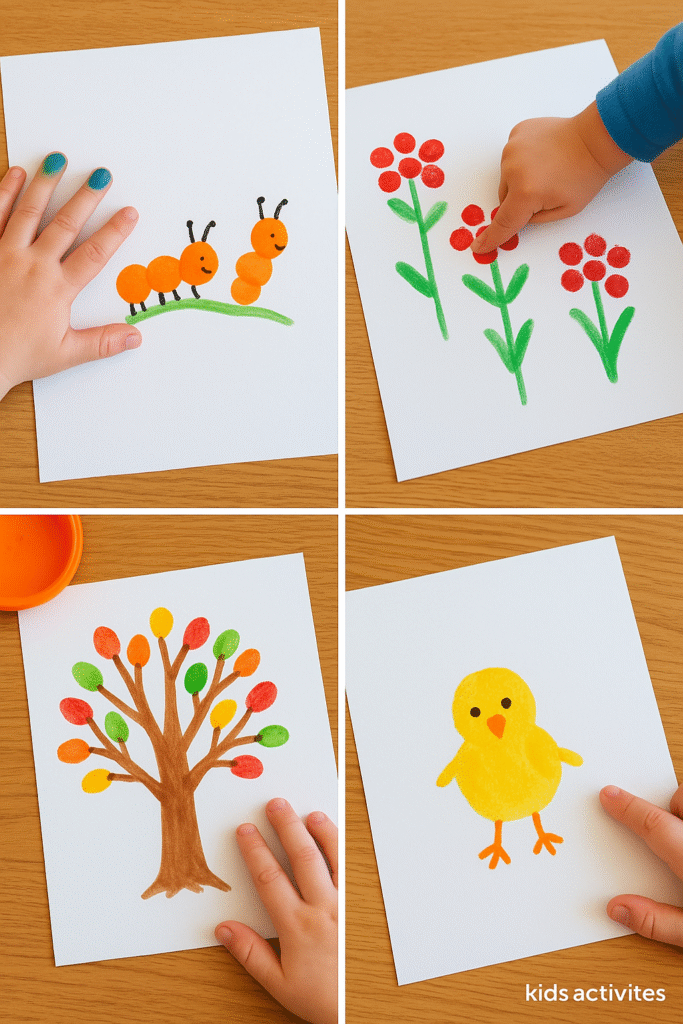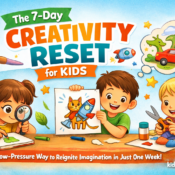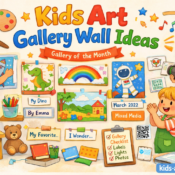
Fingerprint Art for Preschoolers: Easy Projects with Big Learning Impact
Turn Tiny Fingers into Creative Tools
Tired of messy paint sessions or screen-heavy days? Fingerprint art is a charming, low-mess way to build creativity, fine motor skills, and emotional expression—all while having fun.
Designed especially for preschoolers, these activities are easy to set up, deeply engaging, and developmentally purposeful. Whether you’re a parent, teacher, or caregiver, these ideas will transform everyday moments into colourful milestones.
Why Fingerprint Art Works for Preschoolers
Preschoolers thrive on tactile learning and repetition. Fingerprint art helps them:
- Develop Fine Motor Control: Pressing and dabbing strengthen hand muscles needed for writing.
- Recognise Patterns: Repetition teaches visual logic and sequence.
- Explore Emotions: Colour and shape choices reflect how they feel.
- Express Creativity: Kids create characters and scenes from their imagination.
Ideal for ages 3–5, especially in early learning settings and home play corners.
Quick Setup: What You Need
Materials Checklist:
- Washable, non-toxic ink pads
- White cardstock or recycled paper
- Baby wipes or damp cloth for cleanup
- Black pen or marker for detailing
- Cotton swabs or toothpicks for designs
- Optional: googly eyes, glitter, coloured pencils
Tip: Use a plastic placemat to contain the art zone.
5 Fingerprint Art Ideas to Try Today
1. Family Tree with Finger Leaves
- Draw a simple tree trunk.
- Stamp green fingerprints to form leaves.
- Add family member “fingerprint people” at the base.
- Label each one with names or initials.
A perfect project for family bonding and name recognition.
2. Fingerprint Animal Parade
- Stamp rows of fingerprints in various colours.
- Use a pen to add ears, legs, wings, and tails.
- Turn them into cats, birds, elephants, or fantasy creatures.
Boosts imagination and storytelling.

3. Alphabet Finger Art
- Write large letters A–Z on a big sheet.
- Kids decorate each one with fingerprint textures.
- Example: “B” becomes a bumblebee with wings and stripes.
Fun literacy connection with sensory input.
4. Seasons in Colour
- Use red/orange prints for autumn leaves, white for snowflakes, green for spring flowers.
- Match the season or holiday.
Great for monthly themes or bulletin board displays.
5. Emotion Dots
- Stamp 6–8 fingerprints.
- Draw different faces: happy, sad, surprised, silly, etc.
- Label the emotions.
Introduces emotional vocabulary through art.
Free Resource: Fingerprint Art Starter Kit (PDF)
What’s inside:
- Printable family tree template
- Fingerprint animal guide
- Alphabet letter sheet
- Emotion faces outline
Click here to download the free PDF
FAQs for Parents and Teachers
Q: What age group is this for?
A: Best for children aged 3–5. Always supervise when using ink.
Q: Is it classroom-friendly?
A: Yes! These activities are scalable for groups and perfect for art centres.
Q: How do I clean up quickly?
A: Keep wipes on hand. Washable ink pads usually come off with water.
Related Learning Ideas
Final Thought: A Personal Touch That Lasts
Fingerprint art is more than marks on a page. It’s a record of how your child sees the world—one tiny print at a time. These projects create joyful learning moments you’ll want to frame and remember.
From letters to leaves to little monsters, every dab of ink is a win for creativity and connection.




